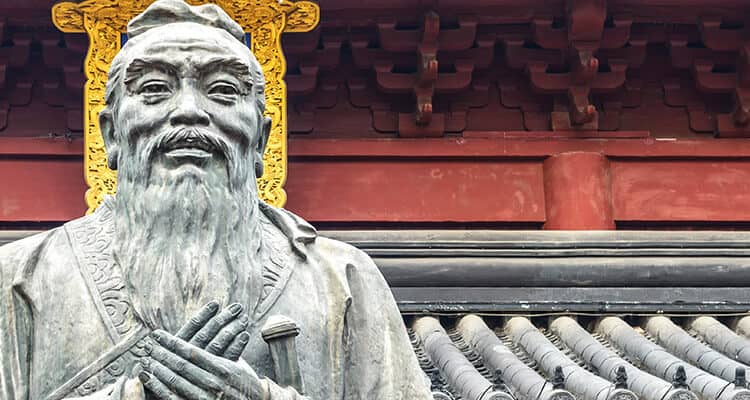- Trending:
- Pope Leo Xiv
- |
- Israel
- |
- Trump
- |
- Social Justice
- |
- Peace
- |
- Love
Patheos Lenses
Side by Side Comparison
The Side by Side Lens allows you to create an easy to read comparison chart for up to three differing religious traditions. Select your traditions from the drop down menus. You can click on the major sections on each chart you build, in order to see more detailed comparisons.
Quick Facts
JUMP TO SECTION
Origins
| Confucianism | Sikhism | |
|---|---|---|
| Beginnings | ||
|
Confucianism
Confucius's ideas became well known only after his death. The 4th-century B.C.E. philosopher Mencius, 3rd-century B.C.E. thinkers Xunzi and Han Feizi, and many others joined the debate about Confucian thought, adding their own ideas about human nature and morality, and considering practical applications, particularly to political rule and government.
| read more »
|
Sikhism
Starting around 1500 in Punjab, Guru Nanak spread a new message about the divine, which developed into the Sikh religion. He served as the spiritual guide of the original community in the town he founded—Kartarpur ("Place of the Creator").
| read more »
|
Taoism
While many in the West associate the term "dao" with Taoism, it was originally used by many participants in a lengthy debate about the proper way to behave and to lead others.
| read more »
|
| Influences | ||
|
Confucianism
Confucius attributed his teachings to the Duke of Zhou, a heroic figure from his home state of Lu who was regarded as the founder of that state. He was also inspired by the rituals and institutions of the Zhou dynasty, founded several hundred years before his birth; by the classic literature of his time; and by legends of the early sage kings.
| read more »
|
Sikhism
The early Sikh tradition challenged the more rigid and rule-based forms of Islam and Hinduism, as well as the self-denying ideologies of other religious groups. The Sikh founders sang of a Universal Creator, and desired to create lasting institutions around worship that could be shared by all people.
| read more »
|
Taoism
Taoism was influenced by the divine bureaucracy of Shang dynasty religion, by Buddhist social organization and ideas about the afterlife, and by ancient Chinese magical, shamanic, and self-cultivation practices.
| read more »
|
| Founders | ||
|
Confucianism
Confucius, whose Chinese name was Kong Qiu (K'ung Ch'iu), was born around 552 B.C.E. and died in 479 B.C.E. He traveled from state to state teaching the sons of the nobility, though he was not famous during his lifetime, and never achieved the high position he aspired to as an advisor to a great ruler.
| read more »
|
Sikhism
Guru Nanak was born in 1469 in a village called Talwandi (now in Pakistan) to a revenue official of the Bedi clan. Nanak was a family man as well as a spiritual guide to disciples ("Sikhs"). In his own lifetime, he nominated the first of his nine successors, Guru Angad.
| read more »
|
Taoism
Authorship of the Taode jing is traditionally attributed to Laozi, a mythical figure who is often regarded as the founder of Taoism. The founder of organized Taoist religion was Zhang Daoling.
| read more »
|
| Scriptures | ||
|
Confucianism
Confucius left no writings, although the "Five Classics" of Chinese literature are traditionally attributed to him as writer or editor. The "Analects" is a collection of aphorisms put together by Confucius's students after his death. The "Liji," or "Record of Rites," also contains dialogs, discourses, anecdotes, and narratives about Confucius and his teachings.
| read more »
|
Sikhism
The Guru Granth Sahib is the sacred scripture of the Sikhs, and its bedrock is the body of compositions of Guru Nanak. The compositions of his successors are also contained in the book, as are songs from other Sikhs praising the Gurus, and non-Sikh poet saints from Hindu and Muslim backgrounds.
| read more »
|
Taoism
Thousands of Taoist scriptural texts, most said to have been transmitted by deities or immortals, have been collected together in a canon called the "Taozang," or Treasury of Tao.
| read more »
|
| Historical Perspectives | ||
|
Confucianism
Some Western scholars have argued that "Confucianism" was manufactured or invented by Asian and Western scholars as an alternative to Western individualism. Scholars have also examined the little-known impact of Confucian studies on Western institutions, including civil service and the examination system.
| read more »
|
Sikhism
The tradition's own scholarship, which wrote about revelation and the growth of the community, goes back several centuries. Today, emerging out of the shadow of colonialism, scholars are involved in the critical study of early Sikh texts and artifacts, and are also trying to understand later trends in the history of the community.
| read more »
|
Taoism
An old distinction between religious and philosophical Taoism guided scholarship in the West until the last decades of the 20th century. Recent scholarship has questioned this distinction, while focusing on Taoist religious groups.
| read more »
|
History
| Confucianism | Sikhism | |
|---|---|---|
| Early Developments | ||
|
Confucianism
Confucianism as an institution was not established until long after the death of its founder. During the 4th and 3rd centuries B.C.E., a diverse collection of writings circulated concerning his life and teachings, with little internal cohesion. It was not until the 2nd and 1st centuries B.C.E. that a cohesive portrait of a "Confucian" tradition emerged.
| read more »
|
Sikhism
The earliest Sikhs gathered to hear the teachings of the Gurus and sing their hymns. The last of the ten Sikh Gurus died in 1708, passing on authority jointly to the community (Panth) and scripture (Granth).
| read more »
|
Taoism
During the Han dynasty, aristocrats continued to study and refine the teachings of Laozi and Zhuangzi, and some sought immortality through alchemy, self-cultivation techniques, and the advice of the fangshi or "recipe masters."
| read more »
|
| Schisms and Sects | ||
|
Confucianism
While there were differing interpretations of Confucianism and disagreements about its meaning, enduring sects with independent organizational structures never formed in the case of Confucianism.
| read more »
|
Sikhism
Early schisms, revolving around issues of family succession and the authority of the Gurus, were resolved around 1700 when the Sikh community was unified as the Khalsa (sovereign body). In the centuries that followed, minor traditions formed within the larger community, but the Panth (community) remains a largely unified body.
| read more »
|
Taoism
Toward the end of the Han dynasty, and continuing for several centuries, sacred texts were revealed by deities and immortals. Around these texts were formed enduring religious organizations.
| read more »
|
| Missions, Spread, Changes, Regional adaptations | ||
|
Confucianism
There were few regional differences in Confucianism, but specific interpretations changed periodically. Zhu Xi (1130-1200), known as the creator of "Neo-Confucianism," developed an interpretation that unified human nature with cosmic principles. Wang Yangming (1472-1529) introduced the idea of "true knowing" -- an intuitive awareness of moral principles attained through self-cultivation.
| read more »
|
Sikhism
Sikh congregations spread throughout the northern part of the Indian subcontinent through proselytizing and trade, from contemporary Afghanistan to eastern India. Sikhs today do not expend much energy in proselytizing, but a diaspora of two million Sikhs has spread communities to East Africa, Southeast Asia, Europe, and North America.
| read more »
|
Taoism
Each Taoist sect experienced notable changes over the centuries, and Taoism also became an integral part of Chinese popular culture. Transmission of Taoist religious organizations beyond China has been limited almost entirely to immigrant communities.
| read more »
|
| Exploration, Conquest, Empire (incl. violence, persecution) | ||
|
Confucianism
Han Feizi's philosophy was of profound importance to the Qin emperor who first unified China in 221 B.C.E. His "Confucianism," which emphasized strict regulations and obedience to authority, was appropriated by the imperial government. The first model of the Imperial Academy was established less than a century later. Here the classics were taught and students were evaluated for positions with the government.
| read more »
|
Sikhism
Sikh warriors contributed to the splintering of the great Mughal empire in the 1700s. By the early 1800s, a kingdom ruled by Sikhs extended in the four directions around Punjab. By 1850, much of that kingdom was annexed by the British in their conquest of the subcontinent.
| read more »
|
Taoism
Taoist groups sometimes formed alliances with rulers. As rivals, Buddhists and Taoists occasionally tried to destroy one another, and rulers often tried to control both as a way of sustaining their authority.
| read more »
|
| Modern Age | ||
|
Confucianism
Confucianism has been both lauded and condemned in the modern age. Confucianism, along with Taoism and Buddhism, has been blamed for China's inability to compete with the West during the 19th and 20th centuries. Confucianism has also been praised as the key to China's unique cultural heritage and strong social order.
| read more »
|
Sikhism
Today, 20 million Sikhs make their home in India. Not living in a sovereign Sikh nation has been a point of contention over the decades, as the Sikh ethos demands independent rule. Nevertheless, there is a large diaspora of Sikh communities around the world.
| read more »
|
Taoism
Taoism was nearly destroyed during the upheavals in China during the late 19th and 20th centuries, but temples and monasteries are now being rebuilt and new clergy are being ordained.
| read more »
|
Beliefs
| Confucianism | Sikhism | |
|---|---|---|
| Sacred Narratives | ||
|
Confucianism
The idea of learning from the past is fundamental to Confucian thinking, and the early histories and biographies are the closest thing to sacred narratives in Confucianism. Among the "classics" are many stories that contain a moral component or exemplify an effort to understand why things happened as they did.
| read more »
|
Sikhism
The creation of the universe came from a single divine command, and human history has been helped along by divine compassion. God sent Guru Nanak to save a world lost in spiritual and moral confusion.
| read more »
|
Taoism
While it lacks a primary and foundational sacred narrative, Taoism has many sacred stories. Among these are narratives describing encounters with spirits and journeys to spirit realms.
| read more »
|
| Ultimate Reality and Divine Beings | ||
|
Confucianism
Confucius did not deny the existence of a reality beyond the human world, but he said that the nature of ultimate reality and the intentions and expectations of divinities are beyond human capacity to know or understand. Human morals should therefore be based on human relationships, without reference to some higher order.
| read more »
|
Sikhism
Kartar, the universal creator, is the only divine being. In his aspect as Universal Preceptor (Satiguru), he reveals perfect knowledge, which can be gained through interaction with the teachings of the Gurus and in communal worship.
| read more »
|
Taoism
Tao existed "before heaven and earth." From Tao came a primordial matrix of undifferentiated energy, and from this matrix, all of existence, including myriads of Taoist gods, emerged.
| read more »
|
| Human Nature and the Purpose of Existence | ||
|
Confucianism
Confucian scholars have long debated essential human nature without reaching agreement as to its fundamental characteristics. Most agree, however, that the purpose of existence is to reach one's highest potential as a human being. Through a rigorous process of self-cultivation that lasts a lifetime, one may eventually become a "perfected person."
| read more »
|
Sikhism
According to Sikh belief, human nature is rooted in self-centeredness (haumai), as opposed to the divine consciousness (gurmat) and benevolence (parupkari) that are ideal. Humans exist in Kartar's total will, which pious Sikhs understand and enact in their daily lives.
| read more »
|
Taoism
To maintain or recover a natural alignment between humanity and the world, many perform self-cultivation techniques. These are believed to improve one's health, and potentially even lead to immortality. They also promote order and harmony within the community.
| read more »
|
| Suffering and the Problem of Evil | ||
|
Confucianism
According to some interpretations of Confucianism, suffering and evil are inevitable in human life, and can promote learning and growth. A mistake is not a "sin," but an opportunity to learn and do better next time. Empathy for the suffering of others also provides motivation to grow morally, but not all humans are capable of empathy.
| read more »
|
Sikhism
Human suffering is caused by ignorance of divine ways and by human self-centeredness. This can be overcome by human effort, self-reflection, and divine grace (gur-prasad) through the Guru's teachings. There is no "evil," apart from the failings of human conscience, and neither Satan nor rival divinities exist.
| read more »
|
Taoism
Taoist ideas about suffering and evil come from a variety of sources and are quite diverse. Many look to Taoist priests to resolve illness or misfortune by communicating on their behalf to the gods.
| read more »
|
| Afterlife and Salvation | ||
|
Confucianism
Confucius stated that the afterlife was beyond human comprehension. Humans should live and behave in such a way as to promote ideal social relations, rather than to act based on the expectations of rewards or punishments after death.
| read more »
|
Sikhism
Liberation from the constraints of this life is available only through entering into the deep protection (sharan) of the Gurus' teachings. The pious reach the divine court (dargah), the location of true justice, after their human lives are over.
| read more »
|
Taoism
Early Taoism focused on this-worldly goals or on immortality of the physical body. Later, in reaction to Buddhism, Taoism incorporated concepts of heaven, hell, and rebirth.
| read more »
|
Rituals and Worship
| Confucianism | Sikhism | |
|---|---|---|
| Sacred Time | ||
|
Confucianism
As Confucius stated that ultimate reality is beyond human comprehension, there is no sense of sacred time outside of ordinary time. Confucius was a great supporter of ritual, as he felt that ritual solidified human social bonds; thus, in a sense, ritual sacralized ordinary time and daily life.
| read more »
|
Sikhism
Sikhs do not believe that Kartar, the divine, divided time into sacred and secular portions. Through the calendar year, Sikhs memorialize the life-events of the Gurus, read special verses on the first of each lunar month, and celebrate the founding of the Khalsa.
| read more »
|
Taoism
Sacred time is experienced when one is aligned with the movement of nature through its regular cycles. It is also experienced as a return to the state of the cosmos before creation occurred.
| read more »
|
| Sacred Space | ||
|
Confucianism
Confucius stated that divine realms are beyond human comprehension, so there is no Confucian concept of a sacred space outside of the realm of life on earth. The focus of Confucianism is ordinary human interactions, and thus, in a sense, the ordinary space of daily life becomes sacred space.
| read more »
|
Sikhism
For the early community, wherever the Guru settled was considered holy. Today Sikhs see the city of Amritsar in northwestern India, founded by the fourth Guru, as their communal center. Places associated with the Gurus' lives are remembered in sacred memory.
| read more »
|
Taoism
Before Taoist ritual begins, a sacred space is created that links heaven and earth. Mountains and caves are also considered sacred spaces, and are often occupied by Taoist hermits.
| read more »
|
| Rites and Ceremonies | ||
|
Confucianism
Despite his disinterest in ultimate questions, Confucius was a strong advocate for ritual. He believed that participation in ritual served to unite people and strengthen the human community.
| read more »
|
Sikhism
Communal worship, singing, and sharing of meals (langar) are most important, and all life-event rituals revolve around the holy word. For example, the Sikh marriage ceremony (Anand Karaj) entails circumambulating the scripture while verses from the Gurus on spiritual marriage to the divine are read.
| read more »
|
Taoism
Taoist rituals are elaborate dramas, lasting over several days, incorporating costume, music, recitations, and stylized movements, and culminating in an ascent to the gods to present a written memorial on behalf of the participants.
| read more »
|
| Worship and Devotion in Daily Life | ||
|
Confucianism
To live one's life as the best person one can be, to constantly strive to cultivate one's character, and to act according to one's proper role within the human community—these are the daily devotional activities of one who is trained under the Confucian system.
| read more »
|
Sikhism
Sikhs strive to achieve divine consciousness in all aspects of their daily lives. This search is rooted in set daily prayers (early morning, sunset, and before sleep) and contemplation of the divine name (simran). Sikhs also congregate to sing the Guru's hymns (kirtan) and hear discourses (katha) on the Gurus' teachings.
| read more »
|
Taoism
Lay people may consult a Taoist priest when they have an illness or a problem. Priests participate in daily rituals of self-cultivation to prepare themselves spiritually for their role.
| read more »
|
| Symbolism | ||
|
Confucianism
Symbols specific to Confucianism are relatively rare, and almost always pertain to scholarship. Stylized images of Confucius attired as a scholar are often seen, and sometimes images of his scholar-disciples are also portrayed in paintings or statues.
| read more »
|
Sikhism
The most important Sikh symbol comes from the first letters in the Guru Granth Sahib, "Ik onkar," symbolizing the unity and infinity of the divine. A second image, called "nishan" symbolizes the triumph of justice (deg teg fateh).
| read more »
|
Taoism
There are a multitude of Taoist symbols, some representing immortality, others related to nature or the stars. A constellation of symbols revolving around writing is essential to Taoism.
| read more »
|
Ethics and Community
| Confucianism | Sikhism | |
|---|---|---|
| Community Organization and Structure | ||
|
Confucianism
In traditional China, Confucianism prevailed within the courts of the nobility and in every arm of the government. The ruler assigned officials to govern at every level, including the local community, and the judiciary was also run by the central government.
| read more »
|
Sikhism
In the face of the rigid Indian system of caste and class, Sikhs offer adherents a casteless and egalitarian social structure. Sikhs believe that any two Sikhs make up a congregation, and where as many as five gather, the divine is present. The immersion of the congregation in the Guru's teachings checks individual self-centeredness.
| read more »
|
Taoism
Organizational structures in Taoism have varied considerably over time and sect, and have ranged from a tightly structured theocracy, to monasticism, to informal relationships with local communities.
| read more »
|
| Leadership Clergy | ||
|
Confucianism
The model Confucian leader was the scholar-official. Years of education in the classic texts culminated in a rigorous series of examinations. Positions within the government were assigned based on the results. Subsequent positions would be based on performance and on one's status with respect to the ruling powers.
| read more »
|
Sikhism
In the Sikh community, authority rests only in the Guru (who is a manifestation of the Divine will), the scripture, and the collectivity of the congregation. Thus there is no room for a formal priesthood. Typically custodians of the holy book, preachers, and musicians are afforded respect for their interaction with, and impartation of, divine revelation.
| read more »
|
Taoism
Some Taoist clergy are married and live at home while others reside in monasteries or temples. They may be male or female, but most today are male. Within each Taoist sect, clergy are ranked according to a formalized hierarchy.
| read more »
|
| Principles of Moral Thought and Action | ||
|
Confucianism
Confucius provided few specific moral principles. One should obey one's elders and superiors and treat rulers, parents, and even those who were not one's social equals with respect. One should also respect ritual, cultivate wisdom, be trustworthy, and strive to do the right thing in any situation.
| read more »
|
Sikhism
Sikhs strive to attain consciousness of the Guru's teachings (gurmat) through reflection on sacred hymns and recitation of the divine name. Ethical actions trump dogma in Sikh tradition, and the most important principles are benevolence, honesty, charity, and striving for justice.
| read more »
|
Taoism
Early Taoism discouraged excessive regulation of morality in favor of natural or secret virtue, but later Taoism adopted and built on the moral precepts of Buddhism. Still later, Confucian elements were added as well.
| read more »
|
| Vision for Society | ||
|
Confucianism
Confucius envisioned a society in which all lived in harmony, content with their place within the social hierarchy. He believed that if a ruler's moral character was exemplary, this would influence his people to behave morally as well.
| read more »
|
Sikhism
The core Sikh social vision is that of equality of all people. Part of the community's reason for existence is to help morally redeem the world in working for social equality and justice.
| read more »
|
Taoism
Taoism has always had a strong utopian vision in which humans, nature, and heaven coexist in peace and harmony. Today, Taoism is often identified with the environmentalist movement.
| read more »
|
| Gender and Sexuality | ||
|
Confucianism
Women were expected to demonstrate exemplary behavior and uncomplaining obedience. Homosexuality was discouraged, but not specifically condemned as "sinful." Abortion was also discouraged, except in cases where the mother's health was endangered.
| read more »
|
Sikhism
In Sikh belief, women and men are equal. Guru Nanak spoke out against the denigration of women in his society. This doctrinal equality provides an ideal to temper the cultural inequalities that Sikh women face around the globe.
| read more »
|
Taoism
Taoists strive to unite masculine and feminine energies, in a ritual context, or within internal alchemical practices. Men are also encouraged to embrace feminine characteristics, and women may take on traditionally masculine roles.
| read more »
|
Editor's picks See all columnists













